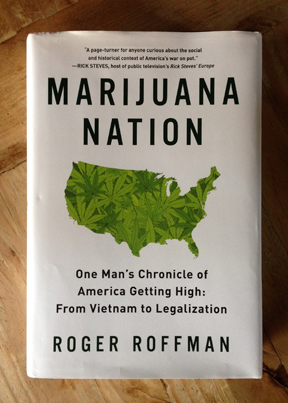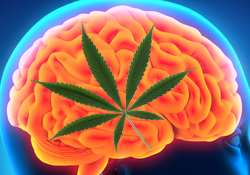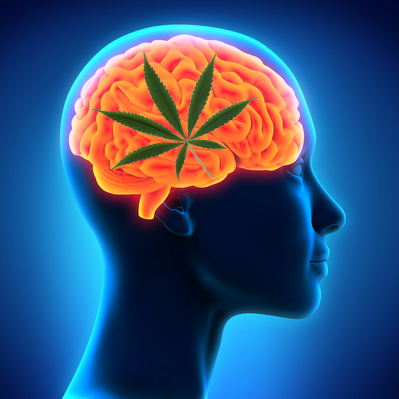I haven’t posted in a while. I’ve been busy reading all I can about Medical Cannabis and the marijuana legalization movement. One of the books I finished recently is Marijuana Nation, by Roger Roffman. It is a very interesting take on the relationship the U.S. has had with marijuana since the mid to late sixties. The author had a very different viewpoint than I’ve read before, and although he is pro-legalization, his struggles with how strongly he feels about marijuana prohibition from a social standpoint, and his own self-discovered cannabis addiction, presented me with quite a bit to think about. My emotions were all over the place when reading this book, especially regarding marijuana addiction, so I really needed time to digest it all to see how I really felt.
I gave myself a week to reflect on what I read, and then went back to read this post below that actually started out as a chapter back when this blog was going to be a book. I wrote it last year, but as I read it over again this week, I once again felt the struggles I had when I wrote it. Is marijuana addictive? Is it really harmless for everyone? As always, I write from my own experience and from the observance of people close to me. This content is too long to cover in one post, so I have to break it up a bit; some today, some more in the following days.
I know this is a lot to read, but if you have ever wondered if pot is addictive, or heard someone else say it is, you really should stick with this series and then decide for yourself. It really IS all about perspective, and everyone’s perspective is just that – theirs.
While cannabis is a true anodyne, it certainly isn’t the cure for all pain. I feel I should fairly represent the reasons why some people feel it is so dangerous for young people, or that it is addictive, by telling a story I know well.
I have a friend who married late in life and had one son. She and her husband were very productive people and considered upper middle class. There son was very friendly, smart and did well in school. A chain of events changed their lives, all of them, forever.
First, before their son hit his “tweens” the father came down with some serious neurological disorder which was finally diagnosed many years later as Parkinson’s Disease. It eventually claimed his life in his late fifties. Soon after his passing, mom also presented problems which were first diagnosed as PTSD, (common to people that have been through so much trauma and drama with a loved one), but a few years later it became evident to all that she had the early stages of Alzheimer’s.
Both parents were active in raising their son until the dad got ill, and then all focus was on dad. Both parents were in total denial that there really was anything serious happening with dad and scurried from doctor to doctor to get a diagnosis they wanted to hear but never came. Once they at least partially accepted that it could be Parkinson’s, many trips were made out of state for treatments that didn’t work, and the disease progressed. Their life was a living hell. They had two very successful home based business that were suffering terribly, despite their best attempts to keep everything seemingly normal. Their son became a forgotten entity in the home because he retreated. Out of sight, out of mind. He was not coping well with his family situation and worked into a solution on his own, which was retreat, get high and play video games. This behavior was overlooked because the parents never saw it coming. Busy coping with their own traumas they never looked at how their son was dealing with it because he wasn’t acting out in a real visible or confrontational manner. He was slipping into his own world without giving them any problems or interference. Some kids act out in a situation like this. Others retreat and that is much harder to see, as it’s something teenagers often do anyway.
He left the house each morning, but he didn’t always go to school. Even though the mom eventually found out about his truancy, pulled him out of public school, and enrolled him in a prestigious private school, he never graduated. He had many friends his age who also enjoyed weed and video games, but they didn’t have the same volatile environment at home, and they didn’t see a problem either. Unrecognized for what it was for so many years, the damage was done and to this day as an adult in his twenties, he lives at home with mom, (supposedly taking care of his mom), has never had a job, and still smokes weed all day and plays video games.
Living in a fairly normal home for most of his life until he was about ten years old, the unforeseeable family circumstances created a very neglected child. By retreating into his own world and not outwardly showing any issues, his problems were never recognized or addressed until after his dad died. By this time the pattern was set and his mom, just at the beginnings of Alzheimer’s, was unable to cope and get him the treatment he needed. I remember how aghast she was when she was finally settling in to a more normal life at home with just her son, and for the first time in years she was seeing his lifestyle choices. She couldn’t believe it and was in total shock. She tried to do what she thought was best at the time but didn’t reach him. Her own health soon declined so quickly that her out of state family came on to the scene to help, but even their valiant efforts of rehab for the son were ineffectual, and he eventually returned to his old self. It’s so unfortunate. There were too many things at play here, and to say pot was the reason for all his problems, (as some people did), is just plain foolish. Yet stories like this are held up as examples of how dangerous cannabis is for youth. The “but what about the children” scenario that we hear again and again by people against legalizing cannabis in any form.
This young boy coped as best he could by himself with an unfortunate situation, but it wasn’t the pot that caused the problem, and you would think that anyone reading this very short version of this family’s tragedy should be able to see this. But people who want to blame the pot will latch on to stories like this as if it were gold, because in their minds it tells the story they want to hear, that pot ruined this child’s life. How sick and untruthful is that?
This young man didn’t get marijuana from his parents, he bought it on the streets. It became his escape, and if he didn’t get the pot on the street he may have used the alcohol that was readily available in his home, but that abuse would have surfaced much earlier, in my opinion. The point is that it’s much easier for kids to get pot on the streets than it is to get alcohol or tobacco products, which are heavily regulated. Doesn’t it make you wonder why marijuana isn’t regulated in the same way? As I see it, it should be.
No matter what you hear from marijuana prohibitionists, the real story is that recent statistics and studies show that cannabis use is down among youth in states that have legal medical and recreational marijuana laws. There are different opinions about why this is, but I feel that as the demand for street cannabis diminishes, so will the number of youth who use it on a regular basis. If it’s not to be found illegally, they can’t get it on a regular enough basis to bother. If my friend’s son had not been able to get street weed, who can really say what may have happened? He would certainly still suffer every psychological problem that can come from trauma and neglect, and the outcome could have been better, or worse. No one can know for sure, but what I am sure of is that pot didn’t ruin his life, it was what he chose to cope with his life, be it a conscious or unconscious decision. If you take pot out of the picture, the situation is still there. This child’s problems were big and persistent long before pot ever appeared on the scene, and as far as I’m concerned that is usually the case with any substance abuse or addiction. I’m not a heath care professional, but I have seen substance abuse take down a good number of people in my 59 years, and there was always an underlying problem that started it.
This story is done, for now, but there is so much more to say on the subject of marijuana and addiction. Part 2 is coming up in a day or two.

